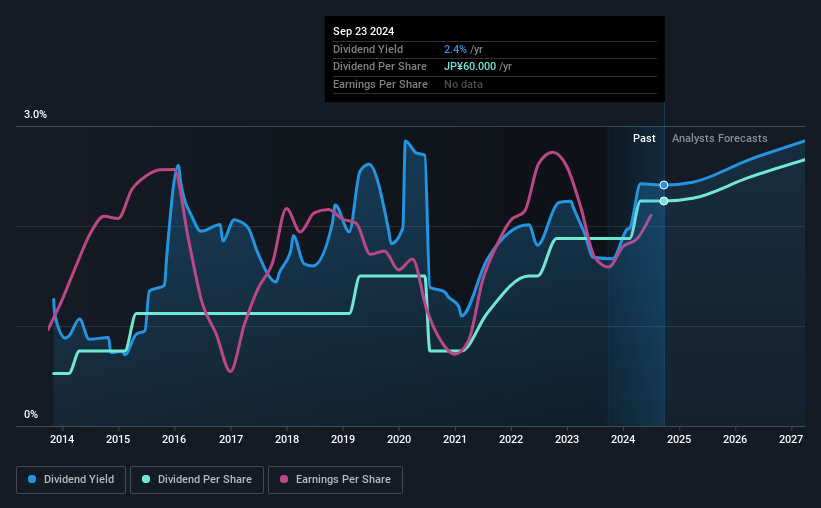- Japan
- /
- Electronic Equipment and Components
- /
- TSE:6807
Japan Aviation Electronics Industry (TSE:6807) Is Due To Pay A Dividend Of ¥30.00
Japan Aviation Electronics Industry, Limited (TSE:6807) has announced that it will pay a dividend of ¥30.00 per share on the 4th of December. This will take the dividend yield to an attractive 2.4%, providing a nice boost to shareholder returns.
View our latest analysis for Japan Aviation Electronics Industry
Japan Aviation Electronics Industry's Projected Earnings Seem Likely To Cover Future Distributions
We like to see robust dividend yields, but that doesn't matter if the payment isn't sustainable. However, prior to this announcement, Japan Aviation Electronics Industry's dividend was comfortably covered by both cash flow and earnings. As a result, a large proportion of what it earned was being reinvested back into the business.
Over the next year, EPS is forecast to expand by 13.2%. If the dividend continues along recent trends, we estimate the payout ratio will be 30%, which is in the range that makes us comfortable with the sustainability of the dividend.

Japan Aviation Electronics Industry Has A Solid Track Record
Even over a long history of paying dividends, the company's distributions have been remarkably stable. The dividend has gone from an annual total of ¥14.00 in 2014 to the most recent total annual payment of ¥60.00. This means that it has been growing its distributions at 16% per annum over that time. We can see that payments have shown some very nice upward momentum without faltering, which provides some reassurance that future payments will also be reliable.
We Could See Japan Aviation Electronics Industry's Dividend Growing
Some investors will be chomping at the bit to buy some of the company's stock based on its dividend history. Japan Aviation Electronics Industry has impressed us by growing EPS at 8.7% per year over the past five years. Japan Aviation Electronics Industry definitely has the potential to grow its dividend in the future with earnings on an uptrend and a low payout ratio.
We Really Like Japan Aviation Electronics Industry's Dividend
In summary, it is always positive to see the dividend being increased, and we are particularly pleased with its overall sustainability. Distributions are quite easily covered by earnings, which are also being converted to cash flows. All in all, this checks a lot of the boxes we look for when choosing an income stock.
Companies possessing a stable dividend policy will likely enjoy greater investor interest than those suffering from a more inconsistent approach. Meanwhile, despite the importance of dividend payments, they are not the only factors our readers should know when assessing a company. Earnings growth generally bodes well for the future value of company dividend payments. See if the 8 Japan Aviation Electronics Industry analysts we track are forecasting continued growth with our free report on analyst estimates for the company. Looking for more high-yielding dividend ideas? Try our collection of strong dividend payers.
New: Manage All Your Stock Portfolios in One Place
We've created the ultimate portfolio companion for stock investors, and it's free.
• Connect an unlimited number of Portfolios and see your total in one currency
• Be alerted to new Warning Signs or Risks via email or mobile
• Track the Fair Value of your stocks
Have feedback on this article? Concerned about the content? Get in touch with us directly. Alternatively, email editorial-team (at) simplywallst.com.
This article by Simply Wall St is general in nature. We provide commentary based on historical data and analyst forecasts only using an unbiased methodology and our articles are not intended to be financial advice. It does not constitute a recommendation to buy or sell any stock, and does not take account of your objectives, or your financial situation. We aim to bring you long-term focused analysis driven by fundamental data. Note that our analysis may not factor in the latest price-sensitive company announcements or qualitative material. Simply Wall St has no position in any stocks mentioned.
About TSE:6807
Japan Aviation Electronics Industry
Provides connectors, user interface solutions, and aerospace electronics in Japan.
Excellent balance sheet established dividend payer.
Similar Companies
Market Insights
Community Narratives


Recently Updated Narratives

Constellation Energy Dividends and Growth

CoreWeave's Revenue Expected to Rocket 77.88% in 5-Year Forecast

Bisalloy Steel Group will shine with a projected profit margin increase of 12.8%
Popular Narratives


MicroVision will explode future revenue by 380.37% with a vision towards success


NVDA: Expanding AI Demand Will Drive Major Data Center Investments Through 2026



